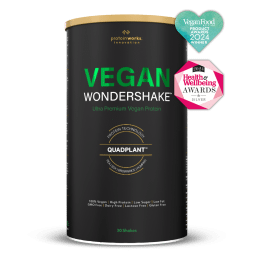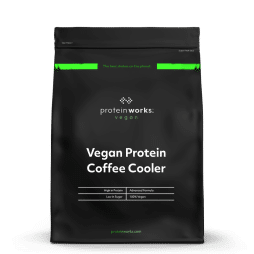
Which Plant-Based Milk is Best?
Plant-based milk has never been more popular. Almost half (48%) of British adults use a plant-based milk alternative in their diet, and consumption is only set to increase over the coming years.[1][2]
From oat and almond to rice and hemp, the shelves are stacked with options – each with its own flavour, texture and nutritional profile. But how do they compare to cow’s milk? And which one is right for your needs?
In this guide, we’ll explore the most common types of plant-based milk, look at their benefits and break down their nutritional content to help you make an informed choice – whether you’re after more protein, fewer calories or a milk that’s kinder to the planet.
What are the Benefits of Plant Milk?
Here are some of the key benefits of plant-based milk alternatives:
1. Lactose-Free and Dairy-Free
All plant-based milks are naturally lactose-free, making them a suitable alternative for those with lactose intolerances or dairy allergies. They’re also suitable for vegans and those following a plant-based lifestyle.
2. Lower in Saturated Fat
Most unsweetened plant-based milks are lower in saturated fat than cow’s milk, especially when compared to whole or semi-skimmed options. Many are also lower in calories too, helping those looking to manage their weight.[3]
3. Fortified with Key Nutrients
Many brands fortify their plant-based milks with vitamins and minerals, including calcium, vitamin D and B12. If you’re cutting out dairy, this means you can still get the essential nutrients your body needs.[4]
4. Better for the Planet
Plant-based alternatives typically require less land, water and energy to produce. They also generate fewer greenhouse gases, making them a more sustainable option.[5]
Different Plant Milks and Their Benefits
Let’s explore some of the most popular types of plant milk and their nutritional value.
Oat Milk
Creamy and slightly sweet, oat milk has become a barista favourite thanks to its froth-friendly texture. It’s higher in carbohydrates than most other plant milks and is high in beta glucan – a type of soluble fibre which can help lower cholesterol and reduce blood sugar. While it’s lower in protein than dairy, soy and pea milk, it’s often fortified with B vitamins, calcium and vitamin D for added nutritional value.[6]
On average, 100ml of unsweetened, fortified oat milk contains:
- Calories: 46
- Protein: 1g
- Fat: 1.5g
- Sugars: 3.8g
- Calcium: 119mg [7]
Almond Milk
Light and nutty, almond milk is a popular choice for coffee, cereal and smoothies. It may be low in protein, but it’s also naturally low in calories and sugar (when unsweetened), so it’s a good choice for people focusing on weight loss. It’s also a good source of vitamin E – a powerful antioxidant with anti-inflammatory properties that supports immune health.[8]
On average, 100ml of unsweetened, fortified almond milk contains:
- Calories: 12.9
- Protein: 0.4g
- Fat: 1.1g
- Sugars: 0.1g
- Calcium: 119mg [7]
Coconut Milk
Not to be confused with canned coconut milk, this cartoned dairy alternative is much lighter, with a subtle coconut flavour. It’s very low in protein and carbohydrates, with most of its calories coming from fat. It adds a tropical taste to smoothies and shakes, but some may find the flavour too strong for use in tea and coffee.
On average, 100ml of fortified coconut milk contains:
- Calories: 20.6
- Protein: 0.1g
- Fat: 0.9g
- Sugars: 1.9g
- Calcium: 124mg [7]
Soy milk
Soy milk is an excellent vegan protein source, with only slightly less protein per 100ml than cow’s milk. It is also a rich source of isoflavones, which have been linked to several health benefits, including alleviating menopausal symptoms and improving memory.[9] Soy milk is a good all-rounder and is widely used for cooking, baking and adding to both tea and coffee.
On average, 100ml of unsweetened, fortified soy milk contains:
- Calories: 25.7
- Protein: 2.4g
- Fat: 1.6g
- Sugars: 0.2g
- Calcium: 119mg [7]
Hemp milk
Hemp milk is lower in protein than soy and oat, but it’s valued for containing omega-3 fatty acids, which are shown to be anti-inflammatory and beneficial for heart and brain health.[10] It’s also a good alternative for people with allergies to nuts or soy. It has an earthy, slightly nutty taste and a smooth, creamy consistency that works in everything from tea and coffee to cereal and smoothies.
On average, 100ml of fortified hemp milk contains:
- Calories: 40
- Protein: 0.1g
- Fat: 2.6g
- Sugars: 1.6g
- Calcium: 124mg [7]
Rice milk
Rice milk is another hypoallergenic option (suitable for those with soy or nut allergies). It’s higher in carbohydrates and sugar than most other plant-based milks, but it contains no saturated fat or cholesterol, making it a heart-healthy choice.[11] It’s naturally sweet and light, making it suitable for use in tea, coffee, cereal, smoothies, and shakes.
On average, 100ml of unsweetened, fortified rice milk contains:
- Calories: 52
- Protein: 0.3g
- Fat: 1g
- Sugars: 4.7g
- Calcium: 120mg [7]
Pea milk
Made from yellow split peas, pea milk is surprisingly high in protein. In fact, depending on the brand and product, it can contain more protein than soy milk, so it’s one of the best alternatives to cow milk from a nutritional perspective. Creamy and neutral in flavour, pea milk works well in everything from coffee to cooking.
On average, 100ml of unsweetened, fortified pea milk contains:
- Calories: 29
- Protein: 3.3g
- Fat: 1.9g
- Sugars: 0g
- Calcium: 188mg [12]
The Take Home
The best plant-based milk for you depends on a variety of factors, including your diet, your palette and any allergies or intolerances you may have. Remember to check the labels for added sugars or unwanted additives, and choose fortified options to make sure you’re getting key nutrients like calcium, vitamin D and B12. With so many varieties available, it’s easier than ever to find a milk alternative that works for you.
References:
[1] https://www.ipsos.com/en-uk/almost-half-uk-adults-set-cut-intake-animal-products
[2] https://www.statista.com/statistics/1278016/milk-substitute-united-kingdom-consumption/
[3] https://pmc.ncbi.nlm.nih.gov/articles/PMC10504201/
[4] https://www.nhs.uk/live-well/eat-well/how-to-eat-a-balanced-diet/the-vegan-diet/
[5] https://pmc.ncbi.nlm.nih.gov/articles/PMC10504201/
[6] https://pmc.ncbi.nlm.nih.gov/articles/PMC10534225/
[7] https://milk.co.uk/hcp/wp-content/uploads/sites/2/2018/07/MilkConsumerweb.pdf
[8] https://www.webmd.com/diet/health-benefits-almond-milk
[9] https://pmc.ncbi.nlm.nih.gov/articles/PMC9410752/
[10] https://pmc.ncbi.nlm.nih.gov/articles/PMC7891210/
[11] https://tools.myfooddata.com/nutrition-facts/171942/wt1
[12] https://tools.myfooddata.com/nutrition-facts/1366462/100g/1








